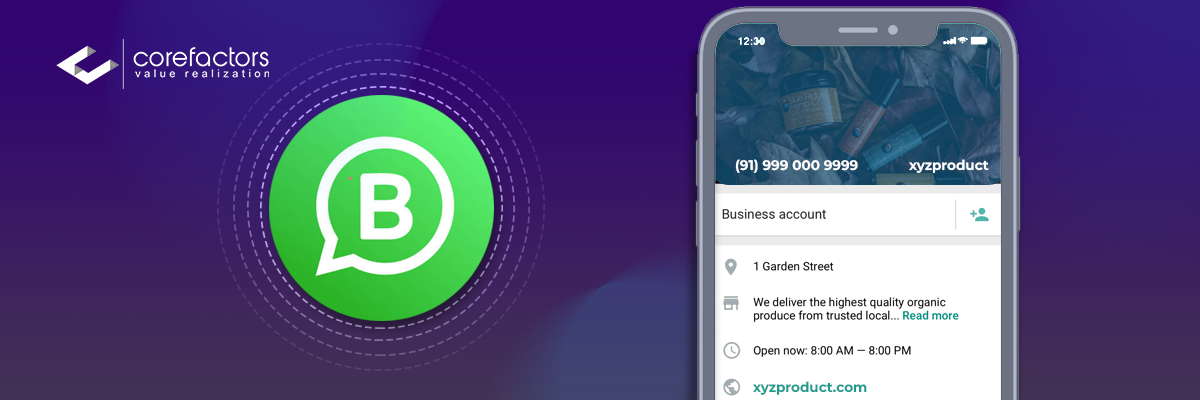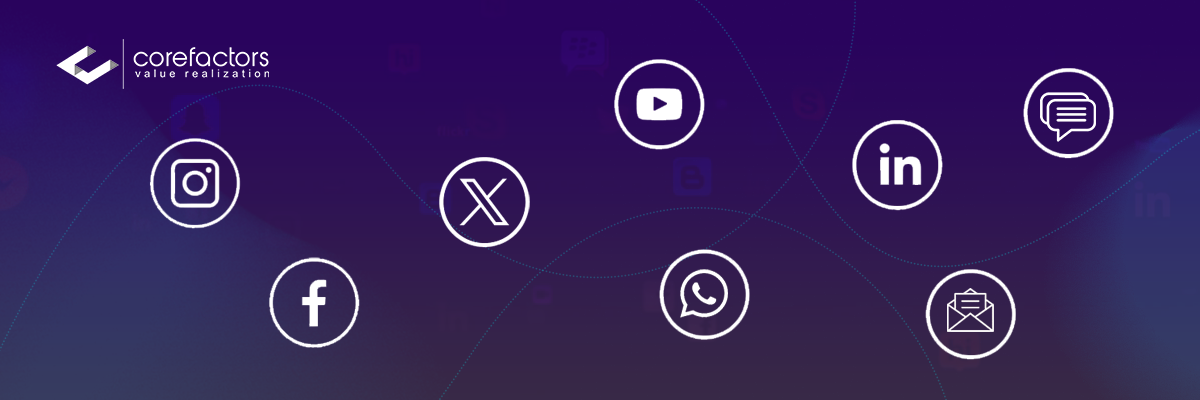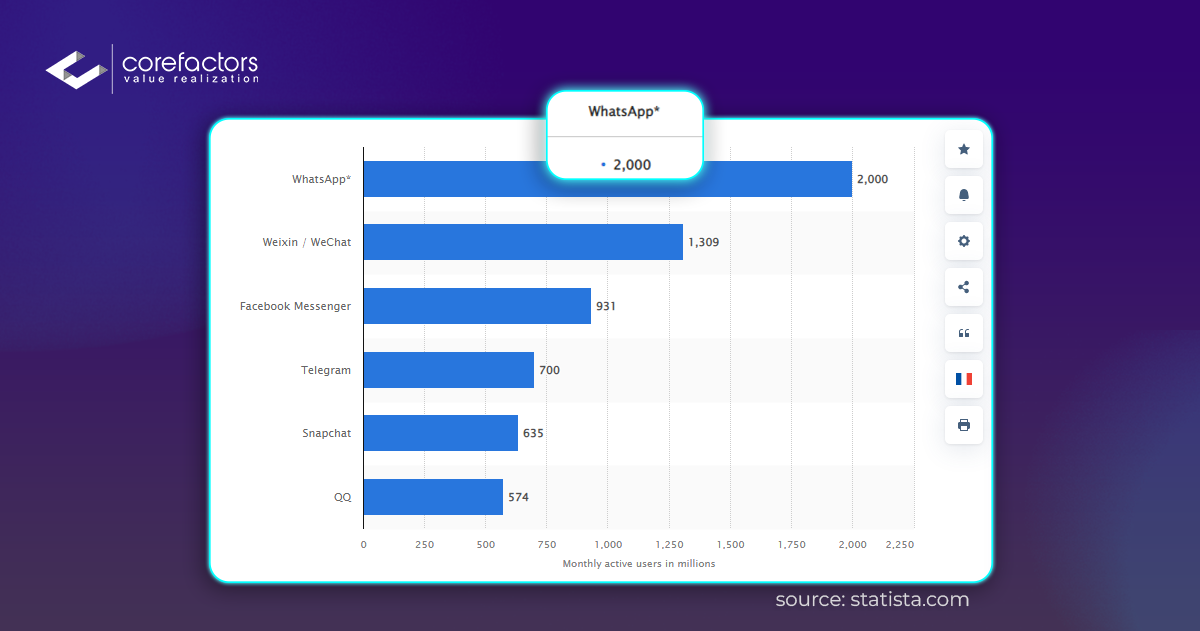How many times a day do you check your WhatsApp messages? Is it more than the number of times you check your Email Inbox?
Chances are it is.
Because WhatsApp is not restricted to business messages, it is a social texting platform.
So, while checking the messages of their friends and family, customers would also come across content from businesses on the same screen.
In its initial days, WhatsApp could only be used to exchange texts. Now, one can open broadcast channels, and chat over a video call. The latest development that is good news for professionals is the use of WhatsApp for Business.
What is WhatsApp for Business?
WhatsApp Business is a global messaging application that can be downloaded for free on Android and iOS. It was built keeping a business owner in mind.
WhatsApp for Business provides tools that allow organizations to automate marketing messages, give prompt replies, and elevate customer support.
Businesses can also integrate WhatsApp APIs into their CRM through third-party applications and monitor all customer interactions.
This blog talks about ten benefits that using WhatsApp for businesses can have.
- Establish Brand Voice
A brand voice denotes the brand’s personality. It is the way customers perceive the brand if the brand were a person. Establishing a brand voice and creating brand awareness among customers is an important marketing tactic.
After all, customers would be more inclined to use a brand’s products they are familiar with and can relate to. WhatsApp automation allows businesses to communicate with customers on a more personal level.
Addressing customers by name while sending out WhatsApp marketing messages, rolling out special coupons on their birthdays or anniversaries, and sending early notifications for an upcoming sale or event are a few examples of leveraging WhatsApp to establish a brand voice and personalize the customer experience.
Moreover, a WhatsApp business account helps businesses showcase their brand logo, website URL, and address, adding legitimacy to the conversation and further emphasizing the brand image.

2. Automate Lead Generation
Many businesses communicate with their customers over WhatsApp for ecommerce. By integrating WhatsApp with their CRM, businesses do not need to spend extra resources on manually collecting leads that contact them via WhatsApp.
Automated messages and chatbots on WhatsApp can be used to gather the required customer information which is then recorded in the CRM for future use.
There are third party solutions like Twilio, or official WhatsApp business API providers like SendPulse that have all the necessary WhatsApp automation features
Once this information is collected, businesses can perform subsequent follow-up activities. The data gathered can help personalize marketing efforts.
3. Scale Omnichannel Marketing
Put one more marketing channel in the basket by covering WhatsApp. The greater the number of touchpoints and communication media, the greater the chances of conversion and customer retention.

People check their WhatsApp daily, making it an important marketing channel. It is the perfect choice to add to the marketing repertoire of a business.
The WhatsApp Business API enables businesses to link one account with many phone numbers (including virtual ones), devices, and users. This speaks for the amount of scalability it provides. With WhatsApp business, unlike other marketing tools, one does not have to pay for each user.
4. Achieve a Global Presence
WhatsApp tops the list of most popular global messenger apps worldwide. With almost 2000 million monthly active users WhatsApp is a clear market leader in instant messaging.

WhatsApp is available in almost all countries, except five. Leveraging such an application for business purposes will bring visibility to a global audience.
Customers only need a phone number to use WhatsApp. There are no charges involved for non-commercial use. So, businesses can easily target millions of customers on a global scale through WhatsApp.
5. Better Customer Engagement
Unlike traditional customer engagement channels, WhatsApp offers a much higher response rate. Customers prefer texting over calling. A survey found that 66% of customers prefer messaging as a form of communication with businesses.
People might delay reading emails for the next business day, but they are prompt when it comes to checking WhatsApp messages. Since WhatsApp is not traditionally used only for business purposes by customers, there is a larger window for sending out engaging content by businesses.
80% of messages on WhatsApp are opened within the first five minutes of being sent. Being a real-time communication channel, leveraging WhatsApp for business is a strategic move that will surely get results.
6. Better Customer Support
It is easier to wrap up a conversation over a conversational texting platform like WhatsApp than it is via Email. Long-drawn phone calls are also resource and time-extensive.
Customers spend more time checking their WhatsApp messages than their SMS or Emails. The user-friendly and intuitive UI of WhatsApp results in quicker responses.
Customer support needs to be prompt to maintain customer satisfaction and retain the existing customer base. WhatsApp ticks all the boxes when it comes to a platform that can enable the customer support team to deliver the best support.
7. Gain Competitive Advantage
Traditional marketing platforms like Facebook, LinkedIn, and Instagram have become saturated. Scrolling through the feeds of these platforms rarely has become a routine task that often ends up in boredom.
WhatsApp marketing is a comparatively newer phenomenon and is yet to be used by all businesses. Gain a first-mover advantage by using WhatsApp marketing messages and standing out from the competition.
8. Data Security
Using WhatsApp for business comes with the added advantage of data security measures in place. Messages sent on WhatsApp have end-to-end encryption. The application strictly adheres to in-country regulations.
As a result, all customer data shared while using WhatsApp for Business remains secure. The app comes with a two-factor authentication that provides extra security and is GDPR-compliant.

Customers can block or report accounts, which can affect quality scores and message-sending quotes. These security measures ensure businesses use WhatsApp for relevant and legitimate marketing campaigns, without spamming the recipient.
9. Automate Responses
Businesses using WhatsApp as a communication channel can opt for different WhatsApp automation that makes the process more efficient.
Instead of spending time and effort in manually replying to each message, WhatsApp automation enables businesses to set up predefined responses to handle commonly asked questions.

Some other examples of WhatsApp automated reply include:
- Sending personalized welcome messages to new users
- Sending reminders for upcoming meetings, events, or sales
- Sending invoices and order confirmations
- Sending pre-set WhatsApp promotional message templates
10. Monitor Customer Behavior
WhatsApp makes it easy to reach out to customers and collect feedback in real-time. While the application itself does not have an analytics tool yet, a WhatsApp Business API user can leverage CRM integrations to track customer interactions and monitor customer behavior.
By measuring metrics like open rates, click rates, customer response time, and more, WhatsApp for Business enables companies to gauge their customer satisfaction and engagement KPIs.
Conclusion
The use of WhatsApp as a business tool is a revolutionary step. Having a robust WhatsApp marketing strategy will help businesses cater to a global audience.
Using WhatsApp for business as a marketing tool is not only easy and does not require special technical skills but is also economical. The client data remains secured and businesses can also use integrations with CRM to gather and study customer behavior and feedback.








